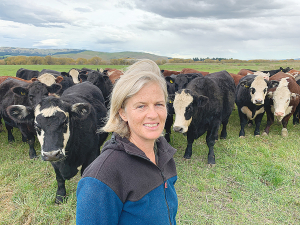Beef Progeny Test strengthens NZ beef genetics
Mating wrapped up last month at the across-breed Beef Progeny Test on Pāmu’s Kepler Farm in Manapouri.
 North Canterbury farmer Bridget Banks is looking forward to benchmarking her cattle’s performance against other commercial beef herds.
North Canterbury farmer Bridget Banks is looking forward to benchmarking her cattle’s performance against other commercial beef herds.
North Canterbury farming couple Bridget Banks and Chris Pennell are focused on developing a really high quality beef herd.
They believe taking part in the Informing New Zealand Beef (INZB) programme is a way to get where they want to be, faster.
The couple farm beef and sheep in a breeding and finishing operation at Ōmihi in the Hurunui district in Canterbury. They are among the latest group of commercial beef farmers selected for INZB’s Next Generation Herds initiative.
She says they are also looking forward to benchmarking their performance against other commercial beef herds in the INZB programme.”
The seven-year partnership between B+LNZ, the New Zealand Meat Board and the Ministry for Primary Industries, aims to boost the beef sector’s profits by $460m over the next 25 years.
over the next 25 years. It is focused on increasing the uptake of genetics in the beef industry. The four main components are building a genetic evaluation and data infrastructure, progeny test herds, developing breeding objectives and indexes and developing new data sources.
Commercial farms play an important role in the programme. By recording data that can be incorporated into breeding value prediction, they will provide increased linkages throughout the beef industry and contribute to genetic evaluations. This will enable increased accuracy with which breeding values, or genetic merit, can be estimated.
With a family farming history in Canterbury that began in 1882, Banks was raised on a farm.
Eight years ago, she and Pennell decided to move to Omihi with their young family, to see how they would adapt to farming. They took to it with a passion.
Banks’ family had purchased the Spurtleton Downs property almost 30 years ago. Two years ago, Bridget and Chris purchased an additional 245 hectares together with parents, Jim and Therese Banks.
“We are now running a combined 800 hectares with just under 120 hectares able to be irrigated,” Banks explains.
“It’s a well-balanced property: 25% mostly pretty easy hill, 25% rolling downs and the balance flatish. We’re running 4000 Romney type breeding ewes, plus we aim for around 150 breeding cattle – both Angus and Hereford.”
Both sheep and cattle are typically finished on the property and each year they also share farm around 500 merinos.
Banks says the requirements for data collection for the INZB programme are straightforward.
“It’s already started. At cow and heifer scanning we asked the vet to record an accurate foetal age rather than just ‘lates’, which is what we used to do.
“That is a workaround so that we don’t have to tag calves at birth for the programme, which is when we will be busy with lambing,” she explains.
“We will need to take samples of DNA from all our bulls and breeding cows - which we will do soon - and then later their calves, to match the calf to the cow and the sire through genotyping.”
They will then record calf growth rates at specific key intervals, along with body condition scoring the cow.
“We’ll also score calf docility, as well as if calving assistance was required, using a predetermined scale.”
The couple has also recently been considering whether artificial insemination is a viable option for the farm and feel this may work well within the programme they are undertaking.
She sees the programme as critical to unlocking the significant potential for genetic gains within the beef industry.
“Having commercial farmers involved in this programme helps assessment of actual on-thefarm performance. More data gives more information to the industry as a whole.”
Former Fonterra executive Alex Turnbull has been appointed CEO to lead all five Yili Oceania Business Division companies in New Zealand.
Fonterra executive René Dedoncker is leaving the co-operative later this year to lead Australian agribusiness Elders.
Alliance Group and the Southland Stags rugby team have joined forces in a partnership that will see the the meat co-operative's farmgate brand feature on players' team kits and replica jerseys.
Fonterra's plan to expand its organic programme to the South Island is being well received by farmers, the co-op says.
Voting has started for the renewal of DairyNZ's milksolids levy.
The most successful catchment groups in NZ are those that have 'a source to sea' approach.

OPINION: Here w go: the election date is set for November 7 and the politicians are out of the gate…
OPINION: ECan data was released a few days ago showing Canterbury farmers have made “giant strides on environmental performance”.